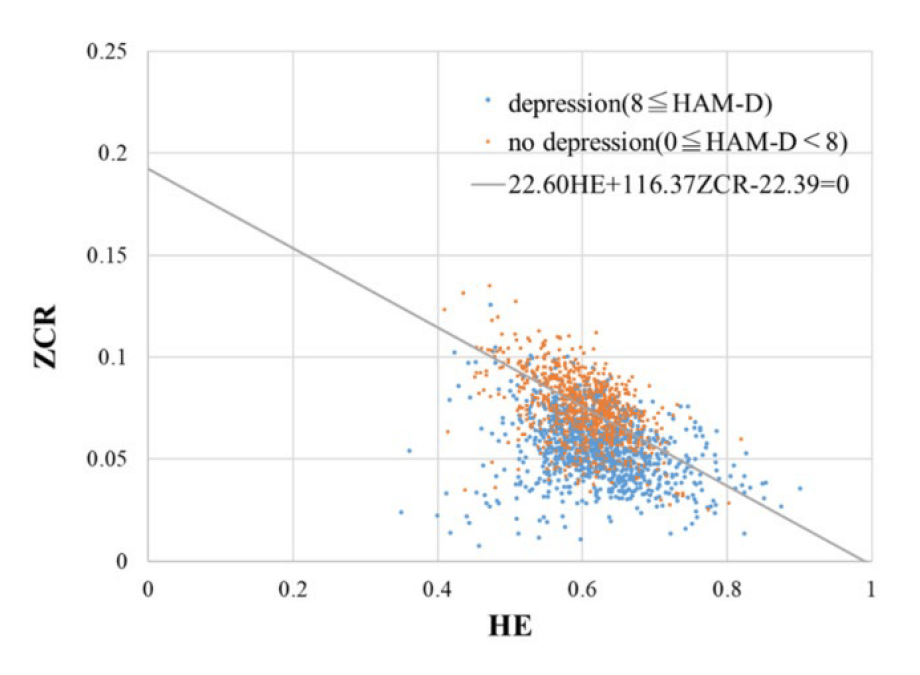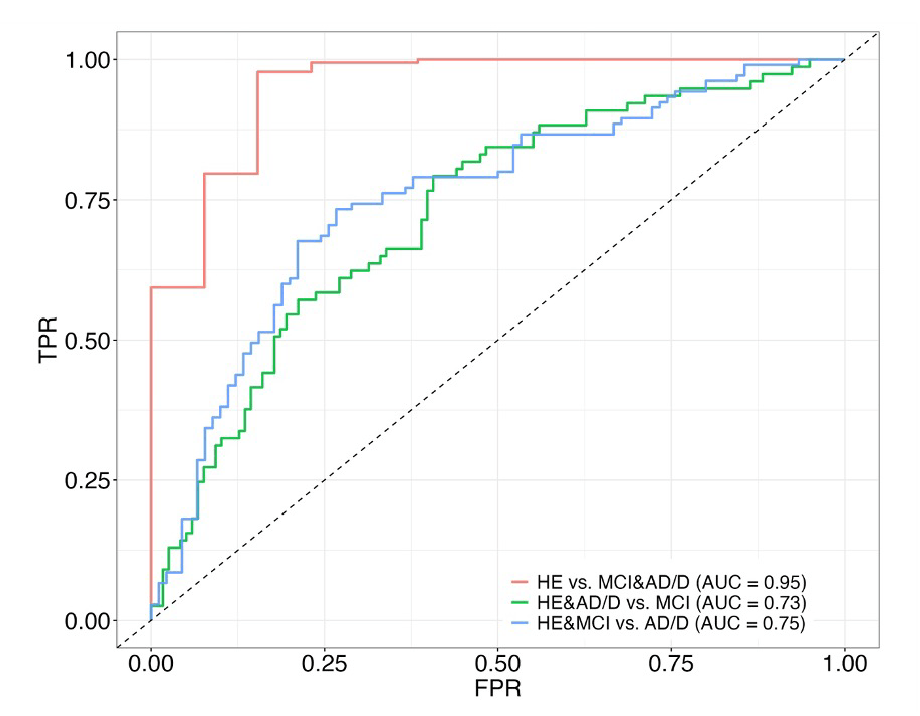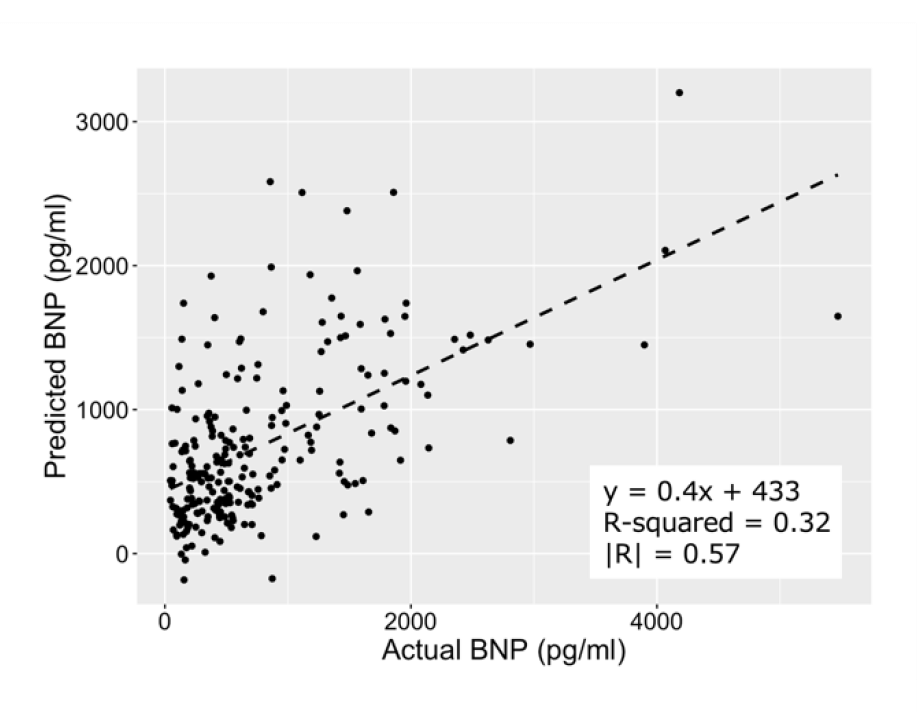RESEARCH &
DEVELOPMENT
R&D
RESEARCH CASE Research Case Examples
DEPRESSION | Development of original vocal biomarkers effective in detecting depression
It has been suggested that the speech sounds of depressed patients are characterized as “dull, monotonous, and lifeless.” In this study, we demonstrated that our original vocal biomarker technology (ALVI: Arousal Level Voice Index), which estimates the subject’s “arousal level,” can be an effective indicator in detecting depressive tendencies.
In our experiment, we assessed the accuracy of detecting depression using ALVI values calculated from the uttered speech of patients visiting Ginza Taimei Clinic (H1) and the National Defense Medical College Hospital (H2). Mean ALVI values were compared between the two groups with and without depression, classified using the Hamilton Rating Scale for Depression (HAM-D) scores, and significant differences were noted at the levels of 10% (p = 0.094) for H1 and 1% (p = 0.0038) for H2. With the 2-group classification, the area under the ROC curve (AUC) was 0.66 for H1 and 0.70 for H2.
Title
Evaluation of the Severity of Major Depression Using a Voice Index for Emotional Arousal
Author
Shuji Shinohara, Hiroyuki Toda, Mitsuteru Nakamura, Yasuhiro Omiya, Masakazu Higuchi, Takeshi Takano, Taku Saito, Masaaki Tanichi, Shuken Boku, Shunji Mitsuyoshi, Mirai So, Aihide Yoshino, and Shinichi Tokuno
Journal
Sensors (Basel): 20(18), 5041
Year
2020

DEMENTIA | Development of a Screening Method for Mild Cognitive Impairment (MCI) and Dementia Using Nonverbal Acoustic Features
To prevent the progression of cognitive decline, it is important to detect MCI and cognitive dysfunction at an early stage and to provide appropriate interventions such as drug treatment. Most speech-based dementia screening studies have constructed machine learning models using textual information, but very long recording times are required to obtain a sufficient number of texts. Therefore, in this study, we extracted nonverbal acoustic features from two simple speech tasks and attempted to differentiate among the three groups of healthy subjects, MCI patients, and dementia patients using a machine learning model. We performed a five-part validation using a total of 195 voice data segments, and found that the mean AUC was 0.81, and the percentage of correct answers for the three groups was 66.7% (approx. twice as high as the chance level of 33.3%). These findings suggest that a simple screening method using nonverbal acoustic features is useful for early detection and continuous monitoring of cognitive impairment.
Title
Novel Screening Tool Using Non-linguistic Voice Features Derived from Simple Phrases to Detect Mild Cognitive Impairment and Dementia
Author
Daisuke Mizuguchi, Takeshi Yamamoto, Yasuhiro Omiya, Koji Endo, Keiko Tano, Misa Oya, Satoru Takano
Journal
Journal of Aging Research & Lifestyle, 12:72-76
Year
2023

Cardiac Failure | Prediction of “brain natriuretic peptide (BNP)” by voice
In collaboration with Dr. Okada of Yokohama City University Hospital, we compared the performance of the blood hormone “brain natriuretic peptide (BNP),” which reflects the state of heart failure, and the heart failure-specific machine learning model developed by our joint research team in predicting the NYHA cardiac function classification commonly used to determine heart failure exacerbations.
As a result, we reported that this machine learning model was able to assess heart failure exacerbation as defined by the NYHA with higher accuracy than BNP, which was considered to be the strongest predictor of re-hospitalization. The above findings suggest that the technical characteristics of our heart failure vocal biomarker, which quantifies the voice symptoms of heart failure and enables non-invasive, remote, convenient, and highly accurate early detection of worsening of heart failure, may open the way for the next generation of heart failure management.
Title
Clinical Utility of Machine Learning-Derived Vocal-Biomarker in the Management of Heart Failure
Author
Kozo Okada, Yasuhiro Omiya, Daisuke Mizuguchi, Koji Endo, Yusuke Kobayashi, yasushi matsuzawa, Noriaki Iwahashi, Masami Kosuge, Toshiaki Ebina, Kouichi Tamura and Kiyoshi Hibi
Conference presentation
The American Heart Association’s 2022 Scientific Session (Chicago/Virtual)
Conference dates
November 5-7, 2022






